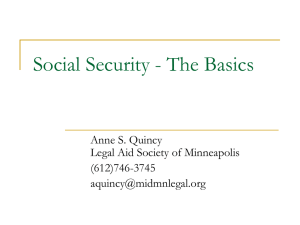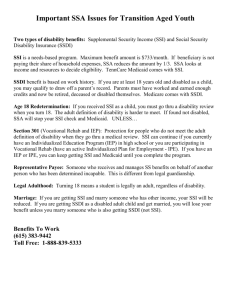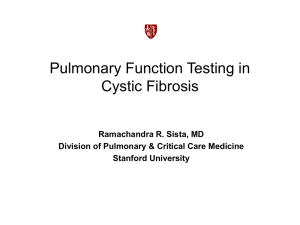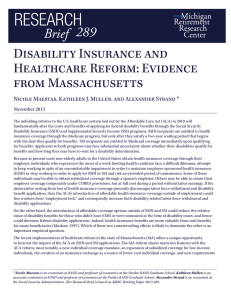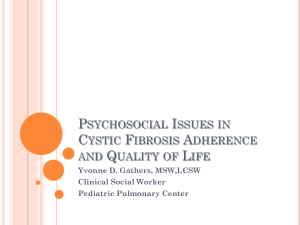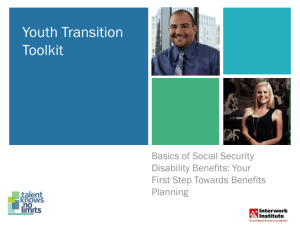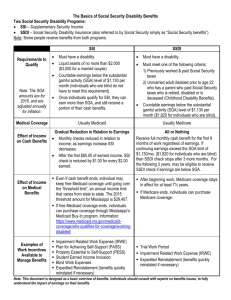Supporting Your Needs-Meg Dvorak, LCSW
advertisement
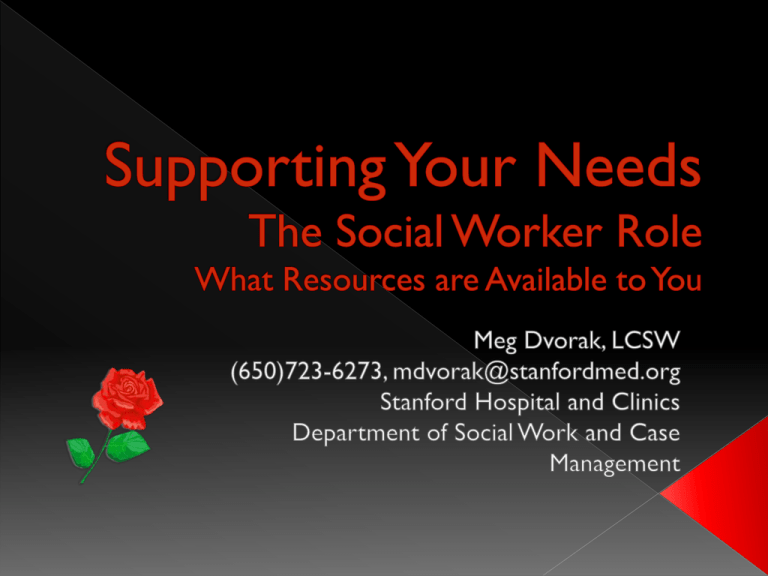
All CF centers are mandated to have SW and it is recommended that patients be seen and screened a minimum of 1x per year All patients are eligible for SW services. There is no cost and the service is optional Goal is to optimize biopsychosocial functioning of CF patients CF patients are vulnerable to social and emotional problems Follow all adult CF patients in the CF clinic for ongoing mental health assessment Counseling and support Referrals for community resources Follow all CF inpatients Provide counseling and support to patients facing health crisis Facilitate communication between hospital providers (including CF team) and patient Coordinate care conferences as needed Linkage to hospital and community resources (massage, guest services, parking, etc) Assist patients facing significant change in health (hospice need, starting 02, diabetes, transplant listing) SW is a common thread for patient across environments More than 50% of CF patients are significantly noncompliant in at least one aspect of management (P.E. Pfeffer et al, 2003) Incomplete adherence is considered normal and should be addressed openly and honestly between CF providers and patients SW provides assessment and counseling around problems related to compliance Important to acknowledge that there are multiple factors contributing to compliance Patient/provider relationship is essential in addressing compliance problems Devastating consequences, preventable Good compliance is essential to transplant listing Increasing numbers of people with CF are living well into adulthood and require assistance with issues in the workplace Lack of appreciation of CF as a disability has created increased economic strain among CF adults who find themselves unable to work for health reasons People who work full time can feel stressed and overwhelmed with the additional burden of medical care, long clinic visits, and unexpected health crises FEV1 and age do not necessarily predict employment status (Burker et al, 2004) Time intensive medical regimen interferes with ability to work in a full time capacity There is an ongoing struggle for balance between good health maintenance and financial stability through work SW provides coaching and counseling to patients around employment issues and assists with important decisions such as taking medical leave or beginning the process of applying for disability Should I disclose my CF in a job interview? SW assists patients with disability process Social Security Disability Insurance (SSDI) is a program that provides a monthly income and Medicare insurance for people with a work history who have become disabled due to their CF Supplemental Security Income (SSI) is a program that provides a set monthly income and Medi-Cal coverage for people who meet certain medical criteria and low income guidelines Apply for benefits at your local Social Security Office CF diagnosis alone does not make a person eligible for benefits. A person applying for SSI or SSDI must meet certain medical criteria. Both SSI and SSDI have the same medical criteria The application and approval process for SSI and SSDI can take months but will pay retroactively if approved Many CF patients are initially denied and must seek legal counsel with appeal process The person has a certain FEV1 based on height The person has been hospitalized 3 times in the year prior to applying for benefits or has had episodes or bronchitis, pneumonia, or hemoptysis resulting in intervention by a physician 6 times in the past year The person has a persistent pulmonary infection requiring intravenous or nebulized antimicrobial use once every 6 months http://www.ssa.gov/disability/professionals/bluebook/3.00Respiratory-Adult.htm http://www.esiason.org/pdf/BEFSSAInformationSheet.pdf The AdvocacyManual: A Clinician.s Guide to the Legal Rights of People with Cystic Fibrosis is a book available for review at your CF Care Center and contains sample letters and additional information about Social Security medical criteria Short term disability benefit for California residents who are temporarily disabled (other states may have similar programs) Pays a percentage of your income during disability period SW can assist with application process There is a 7 day “grace period” before benefits begin. Expect 2-3 week time for your SDI to come through once approved Larger companies (30+ employees) often have short and long term disability programs for employees PLF also under this program (EDD) http://www.usacfa.org/attorneyframe.htm CF legal hotline is available to all CF patients and provides free information about the laws that protect the rights of individuals with CF (800)622-0385/CFLegal@cfserv.com Funded by CF Foundation and other grants Administered by Beth Sufian who is an attorney and adult with CF Insurance is a primary concern among adults with CF Insurance is essential to health maintenance and must be followed and managed carefully SW is not an insurance expert but can consult with patients about a variety of insurance concerns and refer patients to appropriate place for further information Financial counselors available at SHC Insurance program in California for people with genetic diseases like CF Provides coverage for most aspects of CF care as well as primary care Participants must pay an annual fee based on income (0 up to 12,000); however there are no income requirements to be accepted into the program. Once the annual fee is paid, there is no cost for medical care Application process can take up to a year Program is understaffed and it is very difficult to get through on the phone Can work with other insurance programs including Medi-Cal, Medicare, and private insurance. Does not cover anything if person has an HMO Application is downloadable at the website: http://www.dhcs.ca.gov/services/ghpp/Pages/default.aspx (800)639-0597 SW can provide education and advocacy for those applying for GHPP www.thelivingbreathfoundation.org Provides financial grants, scholarships, and other benefits for CF patients Donor funded Gas cards for clinic patients SW can assist with grant applications and offer gas cards when available SW facilitates monthly support group for adult CF patients and their loved ones or caregivers First Friday of every month from 12 to 1pm at the Li Ka Shing Center for Learning, medical school campus Teleconference or Web Ex is available for those who cannot attend due to health concerns or distance from CF center Topics will focus on therapeutic healing and maintaining peace and balance while living with CF 30% adults with CF screened positive for depression; these results were closely related to lung function (Riekert et al, 2007) Professional literature indicates that rates of psychiatric disorders in the CF population do not differ significantly from those of the general population (Admi, 1996; Raymond, 2000) Seeking therapy is a sensible coping strategy for CF SW can refer CF patients for psychotherapy There are multiple options available in the community based on ability to pay, insurance coverage, and type of therapy desired, etc CF Quality of Life Program offers low cost counseling services to CF patients at the Community Center for Health and Wellness, 744 San Antonio Road, Suite 22/24, Palo Alto Therapy can be done via Skype or telephone (650)855-8898 Transition from pediatric program to adult program is a significant milestone for a young adult with CF Can be a time of anxiety, confusion, and disruption of care SW provides counseling, collaboration, advocacy, and resource assistance to those who are going through transition CF patients are constantly adapting and adjusting to increasing complexity of care SW strives to optimize the lives of those with CF using their strengths as a basis for intervention Feedback always welcome Questions??? P.E. Pfeffer, J.M. Pfeffer, M.E. Hodson. The psychosocial and psychiatric side of cystic fibrosis in adolescents and adults. Journal of Cystic Fibrosis 2003 Burker EJ, Sedway J, Carone S. Psychological and educational factors: better predictors of work status than FEV1 in adults with cystic fibrosis. Pediatric pulmonolgy 2004 Admi H. Growing up with a chronic health condition: a model of an ordinary lifestyle. Qual Health Res 1996 6:163-83 Ramond N, Chang P, Crow S et al. Eating disorders in patients with cystic fibrosis. J Adolesc 2000; 23:359-63

